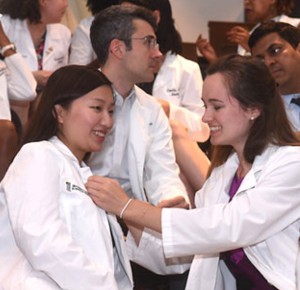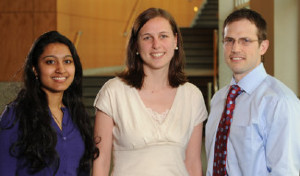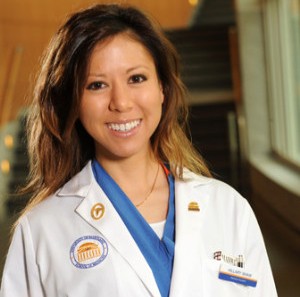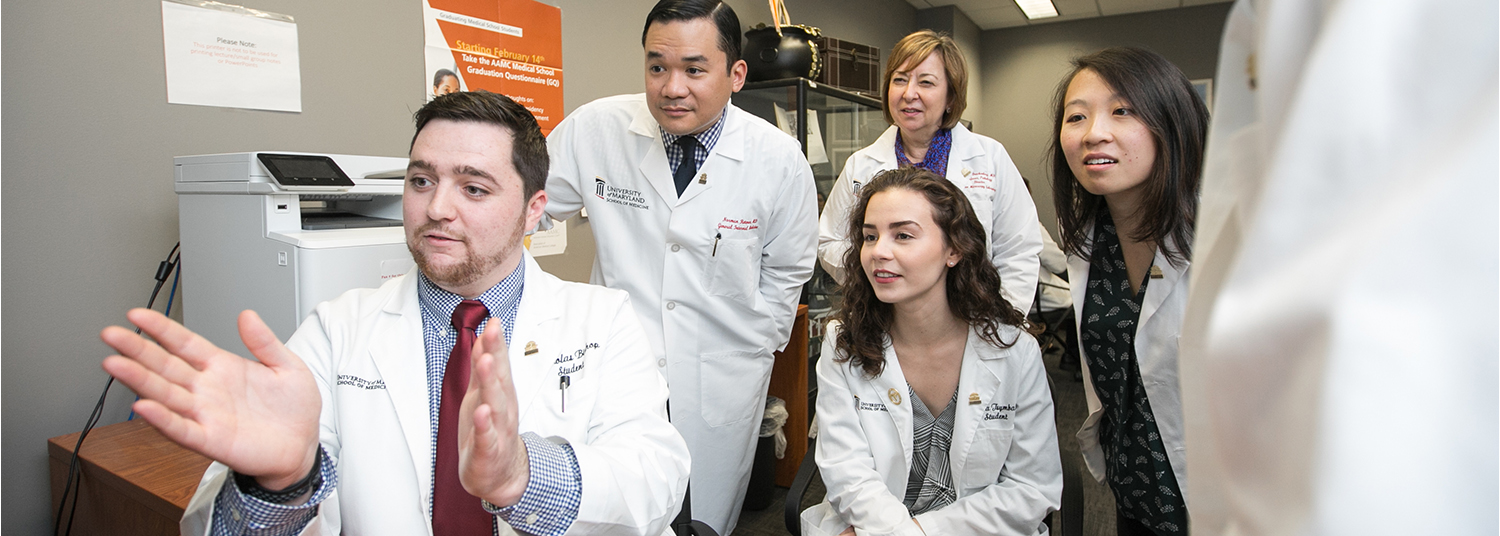Everyone’s journey to medicine is unique. This is a beautiful, demanding, challenging and rewarding field. Having genuine motivation for the work is so important — your patient’s life will depend on it.
As you explore medicine as a career possibility, make sure you ask for help from trusted sources along the way. Close, frequent communication with your premedical advisor is very important. If you do not have a premed advisor at your institution, the National Association of Advisors for the Health Professions (NAAHP) can help you find one.
*Review the Frequently Asked Questions (FAQs) for additional information.*
Applicant Requirements
Timeline: Applying to Medical School
Printer-friendly version
Learn more: AMCAS® Choose Your Medical School Tool >
*If a date falls on a holiday or weekend, the next business day applies.
| July |
|
| August |
|
| September |
|
| October |
|
| November |
|
| December |
|
| January |
|
| February |
|
| March |
|
| April |
|
| May |
|
| Summer |
|
Application Process
All applications to the University of Maryland School of Medicine must be initiated through the American Medical College Application Service (AMCAS).
 Your AMCAS application is the first of a two-stage process and must be on file with AMCAS by the November 1 deadline. Applications are accepted from citizens and permanent residents of the United States, citizens of Canada, and DACA students in the State of Maryland only. All AMCAS applicants are invited to submit a University of Maryland School of Medicine secondary application after the AMCAS application is received.
Your AMCAS application is the first of a two-stage process and must be on file with AMCAS by the November 1 deadline. Applications are accepted from citizens and permanent residents of the United States, citizens of Canada, and DACA students in the State of Maryland only. All AMCAS applicants are invited to submit a University of Maryland School of Medicine secondary application after the AMCAS application is received.
The deadline for the receipt of the secondary application is December 1. In situations where the secondary application is sent to an applicant after the December 1 deadline, the applicant will have two weeks to return the application to the School of Medicine. The secondary application fee of $80 is non-refundable.
It is strongly recommended that the application forms, letters of recommendation and all other supporting credentials be filed as early as is possible in the application period. An extension of the November 1 deadline is unusual and will be granted only under the most extenuating of circumstances.
Early Decision
Early Decision Applications to UMSOM must be on file with AMCAS by the August 1 deadline. All Early Decision applicants will be notified of a decision on their application by October 1.
Learn more about Early Decision
Application Portal
Applicants will be able to complete their secondary application, upload supplemental documents, schedule their interview, conduct their interviews, and receive their Admissions decisions on the Application Portal (AMP).
Secondary Application
Once our office has received your verified AMCAS application, a secondary application invite email will be sent to the email address listed on your application. (If you have a Gmail account, be sure to check the junk/spam folder.)
Rolling Admissions
For all candidates not applying Early Decision, the application process is conducted on a rolling basis. All decisions regarding the selection process are made by a committee of current faculty and students. Each applicant’s credentials are evaluated by the Committee on Admissions to determine if an interview is to be granted.
All interviews are conducted at the School of Medicine and are scheduled in advance by invitation only. Interviews are conducted each week, on Mondays and Wednesdays, from September to early February. Applications may be rejected from both residents and nonresidents without an interview.
Those applicants invited to interview will receive, in writing, one of three decisions from the Committee on Admissions:
Accept
- Applicants who are offered an acceptance will have three weeks to respond to that offer.
- Accepted applicants wishing to hold a seat in the next incoming freshman class must return a non-binding contract to the Office of Admissions.
- A deposit to hold a seat in the class is not required.
Waitlist
- Individuals placed on the Waitlist will be reviewed again after all interviews are complete and will be notified of their ranking on that list. This usually occurs in late April.
- Waitlisted applicants may send updates to the Office of Admissions, at any time, regarding additional activities or accomplishments.
Reject
- Students who have had their application rejected will be urged to consult with their pre-medical advisor.
Students may write to the Office of Admissions at any time during the application process if there are significant concerns or questions regarding the status of their application.
Deferment
A deferment of matriculation for one year may be granted to accepted applicants who present such a request in writing to the Committee on Admissions by June 1. An individual making such a request must present a plan of activity for the coming year that is both focused and productive in nature.
An individual who is granted a deferment must re-apply through the Delayed/Deferred Program at AMCAS, and can apply only to the University of Maryland, to secure their seat for the following year. All policies and procedures for Early Decision will apply.
Applicants who are accepted from the Waitlist are not eligible for deferment.
Your Responsibilities
The medical school application process can be a stressful time for all concerned. We respectfully request that applicants keep phone calls, letters or emails to the Office of Admissions to a minimum. Each applicant must assume responsibility for assuring that all required materials and the completed application packet are filed and received by the Committee on Admissions.
If you have a question or concern about the status of your application, please contact the office to clarify your status. The Office of Admissions will make every effort to assist with the completion of your application, within reason.
All applicants are expected to respond truthfully and completely to all questions on the AMCAS and School of Medicine application forms. An applicant who provides false or misleading information during the application process will be denied admission or, if enrolled before discovery of irregularity in the application process, may be dismissed from school.
Secondary Application

Every applicant who submits an AMCAS application to the University of Maryland School of Medicine receives a Secondary Application. The purpose of our secondary application is to better understand our applicants and their commitment to becoming a physician.
Our optional questions help us get to know our applicants even better and understand more clearly how their backgrounds and lived experiences can positively impact the care of their future patients and the profession. We also include a question that allows you to explain any academic challenges you have experienced.
These short essay questions allow us to better understand you and your commitment to a career in medicine:
- Briefly describe your most meaningful exposure to clinical medicine.
- Briefly describe your most satisfying experience related to community service.
- How does our School of Medicine mission, vision, and values align with your vision for your future career as a physician?
- What does it mean to you to enter a profession?
Letters of Recommendation
Letters of recommendation are as important in the selection process as the applicant's academic credentials and MCAT scores, extracurricular activities, and essays. Applicants to the School of Medicine should seek out letters of recommendation from individuals who have both personal knowledge of the applicant's accomplishments and the insight to objectively assess the applicant's character, work ethic and motivation for a career in medicine.
Members of the Committee on Admissions give little or no weight in the selection process to subjective recommendations from friends, family members and political figures.
If an applicant has significant employment or military experience before, during or after college, then letters from employers, supervisors and commanding officers are appropriate as well.
Policies and Procedures
- A letter of recommendation from the Premedical Advisory Committee or the official Premedical Advisor is recommended and preferred if your undergraduate school has such a committee or advisor, but it is not required. If despite having a premedical committee or advisor at your institution you are still unable to have this letter sent, we recommend you:
- Write a letter to the Committee on Admissions explaining why you are unable to have this letter sent and;
- Ask the Premedical Committee or advisor to write to the Committee on Admissions indicating that they will not be able to send an official letter on your behalf.
-
All letters of recommendation must be written on official stationery and sent directly to AMCAS. If you have a recommender who does not write his/her letter on stationery we will still accept it as long as the letter comes from AMCAS.
-
If your school does not have a Premedical Advisory Committee, you should submit at least three letters of recommendation, and at least two of these should come from undergraduate and/or graduate school faculty whose courses you have taken. At least one letter must come from a science faculty and one from a non-science faculty. We ask that you send no more than six letters of recommendation.
-
If you are not currently enrolled as an undergraduate student and are unable to submit a composite letter of recommendation, please arrange to have at least one letter sent from each component of your education (undergraduate and graduate) and major work experience to date.
-
Any exceptions to the above policy will be considered on an individual basis after receipt of a written request from the applicant.
Re-Application
If you are reapplying to the School of Medicine, the Committee on Admissions highly recommends that you submit updated letters of recommendation. In addition, you should also submit letters from experiences undertaken since your previous application.
Your Responsibilities
Please remember that it is your responsibility to be sure that the above requirements are met. You are also responsible for requesting your letters of recommendation so that they are received by our deadline of January 15.
If you are applying as an Early Decision candidate, your letters of recommendation must be received by August 8.
Applications that continue to miss letters of recommendation will be considered incomplete when they are reviewed by the Committee on Admissions. This will have a direct impact on the disposition of your application.
Academic Requirements
The successful University of Maryland School of Medicine applicant optimizes their undergraduate and graduate education experiences by exploring personal areas of academic interest and life passions through curricular and extracurricular activities. Ultimately, the rigor of a student’s education along with their life experiences and maturity mark readiness for medical education. In addition to the academic requirements detailed below, we value candidates who evidence the following characteristics:
- Academic Excellence
- Leadership
- Service, compassion and humanism
- Commitment to service including service of underserved communities
- Commitment to the accessibility of health care and addressing health disparities
- Ability to work as part of a team
A career in medicine offers opportunities to those talented in both humanities and the sciences. Therefore, there are no specific majors necessary for success. We prefer you think of our curricular prerequisites as competencies, which must be achieved prior to medical school, and not as specific course requirements. We encourage you to familiarize yourself with the AAMC Core Competencies for Entering Medical Students, including the curricular and extracurricular competencies listed, as we believe that strength in these areas will prepare you well for medical school, and for a career in medicine beyond.
The purpose of our listed curricular prerequisites is to provide guidance on strategies for academic preparation for medical school and to identify who will excel in achieving the AAMC core competencies and ultimately be successful in our rigorous academic program. Prerequisite coursework must be completed at an accredited institution recognized by the Council of Higher Education Accreditation, and may be completed as Advanced Placement (AP) or International Baccalaureate (IB) credit, at a community college, and/or online.
Students entering college with a strong background in the sciences, as demonstrated by advanced placement, are encouraged to substitute advanced science courses for the traditional requirements listed below. Although not required, the Committee on Admissions recommends that pre-requisite coursework be completed within five years of when an applicant submits their application.
Curricular Prerequisites
- Biological Sciences – one year with laboratory
- Chemical Sciences (general/inorganic) – one year with laboratory
- Organic Chemistry – either one year with laboratory or one semester of organic chemistry (with lab) and one semester of Biochemistry (lab encouraged but not required)
- Physical Sciences – one year with laboratory
- English or other writing-intensive coursework – one year (*For writing-intensive coursework, the writing assignments should be 50% or more of the final grade.)
Strongly Recommended
These courses are not required, but we believe they will help strengthen the academic preparation of future medical students for success in our medical education curriculum:
- Immunology – one semester
- Biochemistry – one semester with laboratory (lab encouraged but not required)
- Physiology – one semester
- Microbiology – one semester
- Genetics – one semester
- Epidemiology – one semester
The courses you choose to fulfill our prerequisites should demonstrate your commitment to achieve the AAMC Core Competencies. The AAMC Core Competencies for Entering Medical Students also offers additional information. If you are unsure whether your coursework corresponds with our prerequisites, please see additional information about each competency area below.
Biological Sciences
Intellectual engagement in the field of biology, which will include coursework and laboratory experience, that encompasses the core concepts of cell and developmental biology, molecular biology and genetics. These core concepts include:
- Nucleic acid/nucleosome structure and function including epigenetics (histone modification and DNA methylation)
- Cell structure, cell cycle, meiosis, and mitosis
- Genetic mutations, repair, and recombination
- Regulation of gene expression in eukaryotic and prokaryotic cells (transcription factors & mechanisms)
- RNA processing
- Protein translation
- DNA and RNA viruses - properties and generation and use of viral vectors
- Foundations of signal transduction
Chemical (Organic and Inorganic) Sciences
Intellectual engagement in the field of chemistry, which will include coursework and laboratory experience, that encompasses core concepts of biochemistry and biologically applicable elements of inorganic and organic chemistry. These core concepts include:
- Acid/base chemistry
- Thermodynamics and chemical equilibrium
- Protein structure and function
- Enzymes: mechanisms, kinetics, inhibition, and binding constants
- Bioenergetics and oxidative metabolism
- Carbohydrate metabolism
- Lipid metabolism
- Membranes and transport
Physical Sciences
Ability to clearly demonstrate knowledge of basic physical principles and their applications to the study and understanding of living systems is required. These core concepts include:
- Newtonian mechanics
- Fluid dynamics
- Basic thermodynamics
- Basic concepts of electrical circuits and electrostatics
- Diffusion and transport of mass and energy
English or Writing Intensive Coursework
Ability to effectively communicate to convey information or a message clearly through written communication. Experience with oral presentations is also highly valued. *For writing-intensive coursework, the writing assignments should be 50% or more of the final grade.
Clinical Experience Requirement
Clinical experience refers to experiences in which you are exposed to the health care field.
Required
- Observing the doctor-patient interaction through:
- shadowing
- scribing
- interpreting
Community Service Requirement
- Any activity in which you are volunteering your time to help other people. This should be volunteer work that is done outside of course credit.
- Activities do not have to be medical or clinically related.
Selection Process
 The University of Maryland School of Medicine considers for admission students who are citizens or permanent residents of the United States, DACA students in the State of Maryland eligible for Maryland State Financial Aid, or citizens of Canada. Students in the process of applying for permanent resident (PR) status are welcome to apply to the University of Maryland School of Medicine. Their application will be reviewed only after they have obtained their green card. It is the responsibility of the applicant to contact the Office of Admissions to notify us of their updated visa status and provide appropriate confirming documentation.
The University of Maryland School of Medicine considers for admission students who are citizens or permanent residents of the United States, DACA students in the State of Maryland eligible for Maryland State Financial Aid, or citizens of Canada. Students in the process of applying for permanent resident (PR) status are welcome to apply to the University of Maryland School of Medicine. Their application will be reviewed only after they have obtained their green card. It is the responsibility of the applicant to contact the Office of Admissions to notify us of their updated visa status and provide appropriate confirming documentation.
As a state-assisted medical school, the University of Maryland gives preference in the selection process to residents of Maryland. However, a significant number of non-resident applicants are invited to interview and accepted to enter each freshman class.
The School of Medicine welcomes applications from individuals who reside throughout the United States and Canada. Diversity is highly valued in the educational process and applications are encouraged from individuals from nontraditional and disadvantaged backgrounds.
The University of Maryland School of Medicine does not discriminate on the basis of race, ethnicity, national origin, religion, gender or gender identity, sexual orientation, marital status, protected veteran's status, physical or mental disability, age, or any other protected status in its selection process. The University of Maryland, Baltimore also prohibits sex discrimination in any education program or activity that it operates. Individuals may report concerns or questions to the Title IX Coordinator. Read the UMB Notice of Non-Discrimination for more information.
UMB Notice of Non-Discrimination
Applicant Selection Criteria
The decisions of the Committee on Admissions are based on several criteria. These criteria have been developed by the faculty of the School of Medicine and are closely allied to the school's academic mission and values. The School of Medicine will admit only those individuals who have documented that they possess the ability to successfully complete the academically rigorous curriculum and the personal characteristics that we would all like to see in our own physicians.
Academic excellence is expected. However, acceptance is not guaranteed on the basis of excellent grades and MCAT scores alone. Each application undergoes a thorough holistic review. The Committee on Admissions seeks out evidence for the following qualities in the applicant's personal statement, in their extracurricular activities and life experiences, and in letters of recommendation from premedical advisors and others who know the applicant well:
- Psychological maturity
- Character and integrity
- Self discipline
- Adaptability and flexibility
- Good judgment
- Excellent communication skills
- Empathy and concern for helping others
- Intellectual curiosity
- Appropriate motivation for a career in medicine
- Leadership skills
- Commitment to excellence
Your Activities
Applicants should use the Personal Comments section of the AMCAS application to discuss selected extracurricular activities and life experiences, and the relevance of each in their decision to pursue a medical career. There are no prescriptive activities that will guarantee acceptance to our medical school. Each applicant is encouraged to pursue activities that will demonstrate their special talents and which will support their motivation for a career in medicine.
Exposure to clinical medicine, and knowledge of the advantages and disadvantages of medicine as a career, are expected. Research experience and community service are highly valued by the Committee on Admissions. Activities pursued for fun and relaxation are important. Students should pursue activities that they find to be personally fulfilling and enjoyable. The quality, rather than quantity, of these experiences should be emphasized.
Interview Selection
Applications may be rejected from both residents and non-residents without an interview. Those applicants who possess competitive academic records and the personal characteristics noted above may be invited to interview. The interview provides the candidate with an opportunity to discuss their personal history and motivation for a medical career and any aspect of their application that merits special attention or explanation. Candidates should be prepared to discuss any and all aspects of their application.
Interviewers are trained to specifically evaluate an applicant's maturity, adequacy of support systems, level of confidence in their abilities, intellectual curiosity, communication skills, motivation for medicine, depth of involvement in extracurricular activities, and professionalism during the interview, among other factors. Applicants are expected to possess excellent communication skills, to be enthusiastic and knowledgeable about a career in medicine and to conduct themselves in an appropriate fashion during the interview.
The interview evaluations are the last important factor considered by the members of the Committee on Admissions in their deliberations regarding each applicant's candidacy for admission.
Early Decision Program
 The University of Maryland School of Medicine has an Early Decision Program for applicants who are sure that their first choice of medical schools is the University of Maryland. The Committee on Admissions interviews selected Early Decision applicants and makes a decision on these students before considering the regular pool of applicants.
The University of Maryland School of Medicine has an Early Decision Program for applicants who are sure that their first choice of medical schools is the University of Maryland. The Committee on Admissions interviews selected Early Decision applicants and makes a decision on these students before considering the regular pool of applicants.
By applying for Early Decision, the highly qualified applicant avoids having to make numerous other applications. Applicants with less competitive academic credentials, or those without the support of their premedical advisor, are discouraged from applying through this program.
The Early Decision applicant must apply only to this school by the AMCAS deadline of August 1. That means you must submit your application and all transcripts by August 1.
Applicants must provide all supplementary information (secondary application, updated MCAT scores, and letters of recommendation) by August 8.
Interviews will take place at the medical school in mid-September. No one will be accepted without an interview. If offered an acceptance by this school, the applicant cannot apply elsewhere. All decisions for this program are made by October 1.
The Committee on Admissions can make one of three decisions for each Early Decision applicant:
- acceptance
- rejection
- placement into the regular applicant pool for review at a later date
Each applicant will be notified promptly of the decision of the Committee on Admissions so that those not accepted through this program can apply elsewhere.
Individuals who apply through the Early Decision Program cannot apply to any other medical school until they are notified that they have not been accepted through this program at the University of Maryland School of Medicine.
Applicant Responsibilities
- Applicants are expected to conduct themselves in an ethical and professional manner at all times.
- Applicants are expected to become familiar with ALL requirements for admission to the School of Medicine and to have satisfied those requirements at the time an application for admission is made or, if applicable, by the time of matriculation.
- Applicants are expected to review the School of Medicine's Technical Standards (The Essential Requirements for Admission, Academic Advancement and Graduation) and to contact the Office of Admissions with any questions or concerns.
- Applicants are expected to become familiar with and observe our application procedures. All application documents including primary and secondary application forms, transcripts, letters of recommendation, fees, etc., must be submitted in a timely manner.
- Applicants must promptly notify in writing both AMCAS and the School of Medicine of any change of address or other information submitted in the AMCAS application.
- Applicants must respond promptly to an invitation for a medical school interview. In those instances when an applicant cannot appear for a scheduled interview, the applicant is responsible for notifying the School of Medicine of the cancellation of the appointment. The cancellation should be undertaken by sending an email to admissionscommittee@som.umaryland.edu.
- Applicants are expected to be fully prepared, engaged, and participate fully in all interview day activities. Applicants are responsible for notifying the Office of Admissions if their ability to participate is interrupted for any reason.
- Applicants must respond in a timely manner to offers of acceptance to the School of Medicine. Applicants will have three weeks from the date of the letter of acceptance to respond to the School of Medicine’s offer of admission. Failure to respond will result in the withdrawal of the letter of acceptance.
- Applicants must notify the School of Medicine in writing of any change in the status of their application (e.g., the withdrawal of the application, a request to defer matriculation, etc.)
- Applicants who have multiple acceptances must withdraw from all but their first choice of medical school by April 30; May 1 for MD/PhD Programs.
- Applicants in need of financial aid must initiate the steps necessary to determine their eligibility as soon as is possible. These steps include filing the appropriate Need Analysis forms in January or February, and encouraging parents (if required) to file income tax forms early.
Technical Standards
Academic Advancement and Graduation
The mission of the University of Maryland School of Medicine Doctor of Medicine (MD) program is to provide an inclusive learning environment that develops lifelong learners who are clinically excellent and possess humanism, professionalism, scholarship, leadership, critical thinking and attention to social justice and diversity. The University of Maryland School of Medicine is committed to the full and equitable inclusion and support of qualified learners with disabilities.
It is the responsibility of the faculty to select matriculants who are best qualified to successfully complete the required training and develop into skilled, effective, and compassionate physicians that will fulfill the mission of the School. Applicants and matriculated students will be judged not only on their scholastic achievement and abilities, but also on their intellectual, physical, emotional, and ethical capacities to meet the essential requirements of the school’s curriculum. The School of Medicine will consider for admission those individuals who possess the ability to successfully complete the academically rigorous curriculum and the personal characteristics embodied by exemplary physicians. These are guided by the AAMC Core Competencies for Entering Medical Students.
Interview Day
The Office of Admissions hosts virtual interview days on Mondays and Wednesdays from September through February. Once you receive an "invitation to interview" email, you will find more details about your interview day on the application portal.
Your Interview Day
Here is a basic outline of what you can expect on your interview day.
| Schedule | Time |
| Welcome/Q & A | 10:00 a.m. (ET) |
| Possible 45 min. Interview | 11:00 a.m. |
| Lunch with Medical Students | 12:15 p.m. |
| Campus Tour with Senior Students | 1 p.m. |
| BREAK | 1:40 - 2 p.m. |
| Possible 45 min. Interviews | 2 p.m. 3 p.m. 4 p.m. |
Tips for a Successful Interview
- Be yourself
- Present yourself professionally
- Know the contents of your application
- Have prepared questions
- Participate fully in all activities
- Review these tips: AAMC tips for virtual interviews
More to Know
Financial Aid
Residency Classification
When you apply to UMSOM, the Office of Admissions base your residency classification from the "Legal Residence" field on your AMCAS application.
For tuition purposes, your residency classification is determined by the Office of the Registrar. You must complete the in-state classification form and meet all the requirements.
Transfer Policy
University of Maryland School of Medicine does not consider transfer requests.

